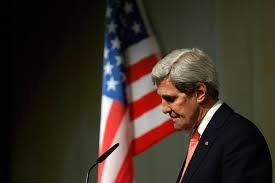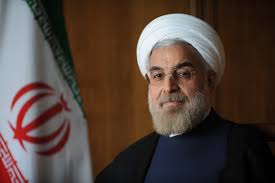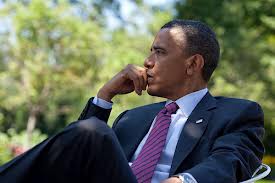
The -foot ( m) diameter granite CIA seal in the lobby of the original headquarters building. (Photo credit: Wikipedia)
 The New Conflict Paradigm – The standards and rules of conflict must change with the changing times
The New Conflict Paradigm – The standards and rules of conflict must change with the changing times
-Christopher Carroll
Today’s world is different. The security threats that our leaders are faced with are different. Enemies are different and more difficult to assess and address than ever before. There is a new security and conflict paradigm in our world, but the world has neglected to acknowledge it and avoided this obvious discussion. Until now.
Technological innovation has accelerated the transforming paradigm and is being utilized differently than ever before but the world’s accepted standards for addressing conflict have failed to keep pace. As a result, warfare and conflict resolution has devolved into legally questionable policies, lacking clear rights or wrongs and without structural oversight, comprehension or commonly accepted standards. The world’s (and our nation’s) rules and expectations of war have failed to evolve as the conflicts have, with the result that there are no longer rules or expectations to guide our latest practices.
Between drones, counter-terrorism policies and modern intelligence gathering, the country has long been overdue for debate about technology in warfare and security. The increasing reliance on drones that has been seen under the Obama administration, not to mention the killing of four American citizens overseas with those drones, has been the first catalyst of this discussion and has raised questions of who is responsible for the technology used in combat, what are the benefits and what are the costs, and what rules govern their use.
Drones
Drones have reduced the number of American deaths in the war on terror and for that reason, are largely viewed as a popular and highly useful tool by the military, CIA, and the Obama administration. The potential benefits that are brought to warfare by Drone technology cannot be denied, enabling American personnel to engage the enemy without risking American lives is an incredible luxury. Keeping American boots many miles from harm while our objectives are still achieved means fewer American deaths; good news for an American military effort and good for domestic policy and morale.
However, not all is sunny. The drones have resulted in many, highly publicized, civilian deaths (though how many fewer civilians would die if soldiers had been on the ground is a question debatable). Due to the difficulty of differentiating between a civilian in the wrong place at the wrong time and an enemy combatant, the drone program, though using technology that is exact, is not as surgically precise as some would have use believe. Every innocent person killed is a tragedy and while an guiltless person can be freed from prison, the death of an innocent human being is irremediable and unequivocally unacceptable.
Counter-terrorism intelligence gathering
Today’s world poses more threats to our security than ever before. One person with a bomb made from materials bought at a hardware store poses a larger danger than many national armies. Unfriendly nations are either in possession of, or shortly will have, nuclear weapons at their disposal. Most terrifyingly of all, discarded, stolen, or purchased nuclear materials could at any time find there way into the hands of violent, borderless and irrational organizations.
We no longer need to fear one or two nations. No longer are we worried about our army standing up against that of another. We don’t fear the Soviets or any single army or country. We fear the lone wolf. We fear the ideologically minded fanatics. We fear those who can slip through the cracks, yet can in an instant wreak havoc on every aspect of our national fabric.
Technology has altered the standard surveillance and intelligence gathering practices that the world and Americans have grown used to. Rules have been stretched and in some recent instances have been crossed, but because there are no new laws to accommodate this new reality, our leadership and law enforcement have been entrusted with keeping us secure without knowing what they are empowered to do. Because our laws and standards are outdated, and because we have yet to have serious discussion about the future of world conflict, our citizenry, our rights, and our safety are simultaneously encroached upon.
Espionage
Technology has changed the meaning of spying and the protection of the secrets of our nation, the assets of our corporations and the intellectual property of our citizenry. While our spies are being caught in Russia wearing wigs, Chinese spies are mining our institutions, departments and emails, looking for information that can be used to their military and economic advantage, all from the comfort of their own computer labs in Beijing.
Until we ask ourselves what regulations and standards we are willing to put into place so as to protect our data, use our data and attain the data of others, we will not be playing on a level field with other agencies and nations in the world. If we don’t address the question of data mining and theft, our security and economy will be constantly be vulnerable.
Clearly, the old rules no longer apply. New rules of warfare and security must be written, accepted and implemented. At the very least, we must acknowledge that the new standards are outside the purview of common and accepted practice. We must not apply the old standards to new phenomena; doing so is both naive and foolish. Our leaders must stop hiding behind courts, smokescreens and press releases and acknowledge that the changing times have resulted in the implementation of new technologies and policies.
But, at the same time, the world public must also acknowledge that things are changing. The world is more fragile and vulnerable than ever before. New laws must be written, new practices taken, new standards allowed and new rules implemented. Only by genuinely laying aside our habits and traditions will we be able to examine what works and what doesn’t. What we need to survive and what we don’t. What we will allow and what is antithetical to our societal standards.
The conflict and the danger that accompanies the world today, is an altogether different entity than has ever been seen in society before. The greatest enemy (and the one most likely to hurt us) is the enemy before unseen. It isn’t the army at the other end of the battlefield, nor is it the navy drifting in the sea nor is it the air force flying through the sky. We, as a nation, will meet these dangers and challenges only if we can accept and comprehensively debate the necessary laws, standards and rules that must accompany that reality.
Filed under: National Security, Uncategorized | Tagged: Conflict, Counter-terrorism, Drones, Espionage, Law, Rules of War, Technology | 1 Comment »

 The Geneva negotiations have as of yet proved fruitless. “We haven’t achieved anything,” explained U.N. envoy Lakhdar Brahimi. The stakes, however, are high. Since the beginning of the conflict, more than 100,000 people have been killed, with nine million Syrians forced to flee from their homes and a recent testimony by Director of National Intelligence James Clapper suggests that regions in the country are becoming a center of radical extremism and a potential threat” to the United States.
The Geneva negotiations have as of yet proved fruitless. “We haven’t achieved anything,” explained U.N. envoy Lakhdar Brahimi. The stakes, however, are high. Since the beginning of the conflict, more than 100,000 people have been killed, with nine million Syrians forced to flee from their homes and a recent testimony by Director of National Intelligence James Clapper suggests that regions in the country are becoming a center of radical extremism and a potential threat” to the United States.



























